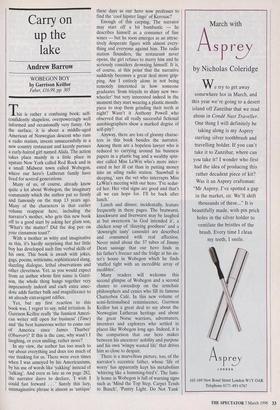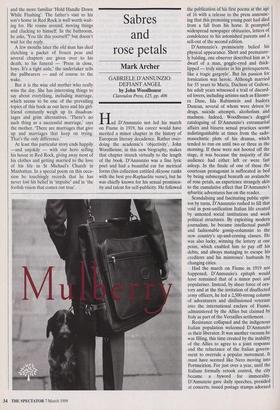Carry on up the lake
Andrew Barrow
WOBEGON BOY by Garrison Keillor Faber, £16.99, pp. 305 This is rather a confusing book: self- confidently shapeless, overpoweringly well informed and occasionally very funny. On the surface, it is about a middle-aged American of Norwegian descent who runs a radio station, invests unsuccessfully in a new country restaurant and keenly pursues a curly-haired girl named Alida. The action takes place mainly in a little place in upstate New York called Red Rock and in a small Midwest town called Wobegon, where our hero's Lutheran family have lived for several generations.
Many of us, of course, already know quite a lot about Wobegon, the imaginary community which the author put so firmly and famously on the map 13 years ago. Many of the characters in that earlier volume reappear here, including the narrator's mother, who gets this new book off to a good start by asking her glum son, `What's the matter? Did the dog pee on your cinnamon toast?'
With a mother as witty and imaginative as this, it's hardly surprising that her little boy has developed such fine verbal skills of his own. This book is awash with jokes, gags, poems, witticisms, sophisticated slang, dazzling dialogue, lethal observations and other cleverness. Yet, as you would expect from an author whose first name is Garri- son, the whole thing hangs together very impressively indeed and each extra anec- dote adds further bulk and magnificence to an already extravagant edifice.
Yes, but my first reaction to this book was, I regret to say, mild irritation. Is Garrison Keillor really 'the funniest Ameri- can writer still open for business' (Time) and 'the best humorous writer to come out of America since James Thurber' (Observer)? If this is the case, why wasn't I laughing, or even smiling, rather more?
In my view, the author has too much to say about everything and does too much of our thinking for us. There were even times when I was annoyed by his Americanisms, by his use of words like 'yakking' instead of `talking'. And even as late as on page 282, the narrator dares to declare, 'I wish I could fast forward . . • ' Surely this lazy, unimaginative phrase is almost as 'antique' these days as our hero now professes to find the 'cool hipster lingo' of Kerouac?
Enough of this carping. The narrator may start off a bit bombastic — he describes himself as a consumer of fine wines — but he soon emerges as an attrac- tively desperate figure with almost every- thing and everyone against him The radio station flounders, the restaurant never opens, the girl refuses to marry him and he seriously considers drowning himself. It is, of course, at this point that the narrative suddenly becomes a great deal more grip- ping. Am I entirely alone in not being remotely interested in how someone graduates 'from tricycle to shiny new two- wheeler' but very interested indeed in the moment they start wearing a plastic mouth- piece to stop them grinding their teeth at night? Wasn't it Anthony Powell who observed that all really successful fictional autobiographers show a marked degree of self-pity?
Anyway, there are lots of gloomy charac- ters in this book besides the narrator. Among them are a hopeless lawyer who is reduced to carrying around his business papers in a plastic bag and a wealthy spin- ster called Miss LeWin who's more inter- ested in her ill cat than in putting money into an ailing radio station. 'Snowball is sleeping,' says the vet who interrupts Miss LeWin's meeting with our hero. 'I've sedat- ed her. Her vital signs are good and that's all we can hope for. be back after lunch.'
Lunch and dinner, incidentally, feature frequently in these pages. The bratwurst, knockwurst and liverwurst may be laughed at but sweetcorn 'as God intended it', a chicken soup of 'dizzying goodness' and a `downright tasty' cassoulet are described and consumed with real affection. Never mind about the 37 tubes of Jimmy Dean sausage that our hero finds in his father's freezer and the fridge at his sis- ter's house in Wobegon which he finds `stuffed tight with an incredible array of inedibles'.
Many readers will welcome this second glimpse of Wobegon and a second chance to eavesdrop on the armchair philosophers and cynics who fill its famous Chatterbox Café. In this new volume of semi-fictionalised reminiscence, Garrison Keillor has a great deal to say about the Norwegian Lutheran heritage and about the great Norse warriors, adventurers, inventors and explorers who settled in places like Wobegon long ago. Indeed, it is the comparison that our hero makes between his ancestors' nobility and purpose and his own 'wimpy wasted life' that drives him so close to despair.
There is a marvellous picture, too, of the narrator's eccentric father, whose 'life of worry' has apparently kept his metabolism `whirring like a humming-bird's'. The fami- ly home in Wobegon is full of warning signs such as 'Mind the Top Step. Carpet Tends to Bunch', 'Pantry Light. Do Not Yank' and the more familiar 'Hold Handle Down While Flushing'. The father's visit to his son's home in Red Rock is well worth wait- ing for. He roams around, moving things and clucking to himself. In the bathroom, he asks, 'You tile this yourself?' but doesn't wait for the reply.
A few months later the old man has died clutching a packet of frozen peas and several chapters are given over to his death, to his funeral — 'Press in close, boys. It's a tight aisle,' the undertaker tells the pallbearers — and of course to the wake.
But it is the wise old mother who really wins the day. She has interesting things to say about everything, including marriage, which seems to be one of the prevailing topics of this book as our hero and his girl- friend constantly weigh up its disadvan- tages and grim alternatives. 'There's no such thing as a successful marriage,' says the mother. 'There are marriages that give up and marriages that keep on trying. That's the only difference.'
At least this particular story ends happily —and unjokily — with our hero selling his house in Red Rock, giving away most of his clothes and getting married to the love of his life in St Michael's Church in Manhattan. In a special poem on this occa- sion he touchingly records that he has never lost his belief in 'impulse' and in 'the foolish vision that comes out true'.



























































 Previous page
Previous page